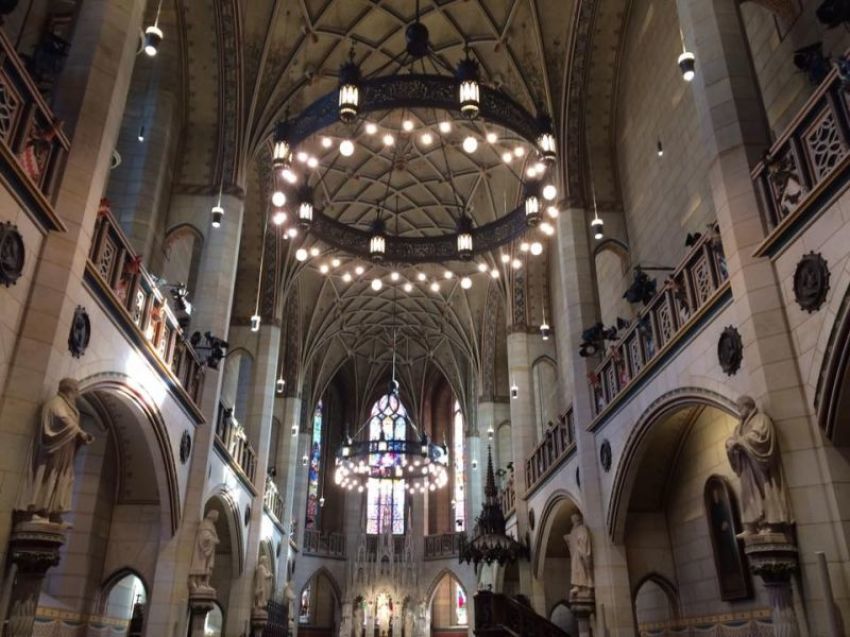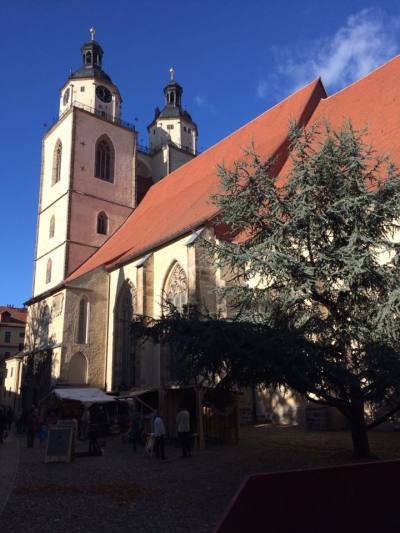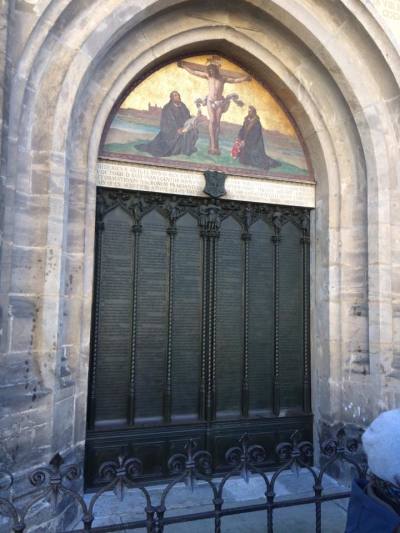What American Christians in Wittenberg Were Thinking on the 500th Anniversary of the Reformation

WITTENBERG — American Christians were among the tens of thousands who marked the 500th anniversary of the Protestant Reformation in the city where it all began.
Last Tuesday, evangelical Protestants around the world marked the 500th anniversary of the beginning of the Reformation. On that day, it is widely believed that an Augustinian monk named Martin Luther nailed 95 theses to the door of Castle Church in Wittenberg. Luther's theses objected to, among other things, the Roman Church practice of selling papal indulgences.
Church services and speakers commemorated the day in various ways on Oct. 31 and the streets and town square were set up with craftsmen and sellers of all kinds of German foods, beer, and several places where visitors could purchase mulled wine in clay cups.
Paige Brinks and Rachel Dieleman, two friends who are recent graduates of Calvin College in Michigan and are both living in Europe for graduate and teaching fellowships, said the journey was spiritually significant for them.
"It's a very interesting feeling knowing Luther was here. I've been hearing these stories my whole life but to actually see where he lived and the church where he nailed the 95 theses on, it makes it feel a lot more real," Brinks told The Christian Post in an interview off the main street in downtown Wittenberg.
The two attended the morning worship service at 10 a.m inside All Saints Church (Castle Church), which was mostly in German with certain greetings and scriptures also read in English. The opening hymn was Luther's famous "A Mighty Fortress Is Our God" ("Ein Feste Burg ist Unser Gott").

"It's neat to think about the progression of society in 500 years and to see how there is still the basis of religion that still exists. Even though we live in a secular culture, in a time that often puts down the foundations, it's very inspiring to think about our forefathers, how they were religious and how they influenced us to shape culture," Dieleman said.
"It was inspiring to have the reminder of Luther's confidence in his faith and to not be afraid and be scared of what people are going to say or think. Personally, that has inspired me just living right now in France in more of a secular nation and more liberal, just to be firm in my beliefs and to speak up for what I believe in."
Danielle Hitchen, author of Bible Basics who made the pilgrimage to Wittenberg for the Reformation's 500th anniversary with her husband and two children, said Martin Luther is one of the main reasons why she is now an Anglican.
"I started reading Martin Luther's theology in college as part of our curriculum and Martin Luther talked about the Eucharist and the way it is the climax of the church service and I thought it was so beautiful," she told CP just outside St. Mary's church in Wittenberg where Luther often preached.
Hitchen grew up in a nondenominational evangelical household but moved to a liturgical tradition in light of the Reformer's words, a spiritual transition she describes as "the most meaningful theological move of my life," one which made her faith more real.
"It's amazing to think that this man (Luther) who did so much theological work that continues to have ripples 500 years later walked these streets and preached right here in this church. It's just amazing to be here," Hitchen said.
The Rev. Michael Kumm, a Lutheran pastor in the Lutheran Church Missouri Synod who chairs the LCMS Board of Directors and is from Dakota Dunes, South Dakota, described the day as a "once in a lifetime experience." He is also the chair of the International Lutheran Society of Wittenberg.
"Having been a lifelong Lutheran I have learned about the Lutheran Reformation all my life." he noted, recounting the "waft of emotion" that came over him as he got to preach the Gospel at one of the services that took place in the city that day.
With his wife Janet by his side, he told CP he believes that despite the rise of secularism in the West, God continues to move.
"I'm a baby boomer and we were the generation that really started to move away from the church, to be blunt about it. And I see the younger generations coming up today; they are looking, they are searching, they are yearning for tradition, the faithful teaching, the truth. They want to be told 'what does this mean,'" regarding the Word of God, Kumm said, noting that "what does this mean" was one of Luther's favorite phrases.
"I really think that [young people] have gotten beyond the previous generations who want to change the church into society. I really think that society is asking God to come back into them and bring the church back into society again. Thanks be to God for that."

David Dickey of Fort Walton Beach, Florida, had been planning to be in Wittenberg for the 500th anniversary of the Reformation for 15 years. A member of the Air Force, he and his family were stationed in Germany 10 years ago and thought then that they must return to Wittenberg when 2017 rolled around. Today, they attend a Presbyterian (PCA) church.
"Martin Luther is an awesome example of faith and courage and conviction, which is a very timely message today," Dickey told CP Tuesday evening, standing a short distance away from the famous Castle Church doors where Luther's 95 theses were posted.
"It's so interesting to be a in a place that, five centuries ago, played such a huge role in the Christian church and in the development of the church in the world."
He regards the 500th anniversary of the Reformation as one event in a long series of events over time that represents the movement of God on the earth and throughout the world.
"The Church waxes and wanes in various places," he added, noting that you can see what has happened to Germany since Martin Luther's day.
"But where you see it wane you see it ascending in other areas. And it's one of the amazing things about the faith — that we can't predict where it goes or how it goes. But it always goes."



























